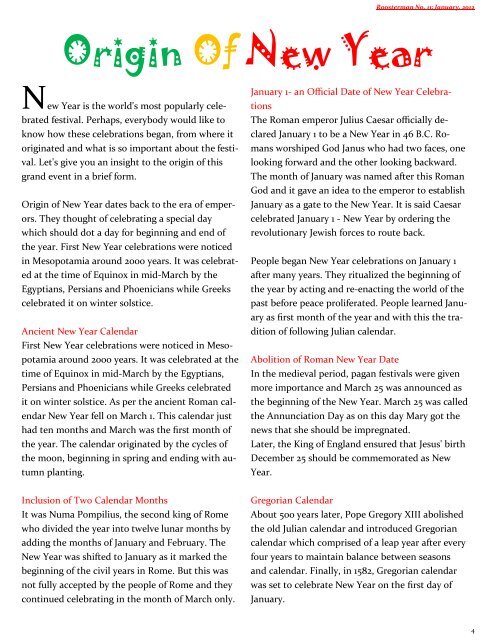Roosterman No. 11
Roosterman No. 11
Roosterman No. 11
- No tags were found...
Create successful ePaper yourself
Turn your PDF publications into a flip-book with our unique Google optimized e-Paper software.
<strong>Roosterman</strong> <strong>No</strong>. <strong>11</strong>; January, 2012Origin Of New YearN ew Year is the world's most popularly celebratedfestival. Perhaps, everybody would like toknow how these celebrations began, from where itoriginated and what is so important about the festival.Let's give you an insight to the origin of thisgrand event in a brief form.Origin of New Year dates back to the era of emperors.They thought of celebrating a special daywhich should dot a day for beginning and end ofthe year. First New Year celebrations were noticedin Mesopotamia around 2000 years. It was celebratedat the time of Equinox in mid-March by theEgyptians, Persians and Phoenicians while Greekscelebrated it on winter solstice.Ancient New Year CalendarFirst New Year celebrations were noticed in Mesopotamiaaround 2000 years. It was celebrated at thetime of Equinox in mid-March by the Egyptians,Persians and Phoenicians while Greeks celebratedit on winter solstice. As per the ancient Roman calendarNew Year fell on March 1. This calendar justhad ten months and March was the first month ofthe year. The calendar originated by the cycles ofthe moon, beginning in spring and ending with autumnplanting.January 1- an Official Date of New Year CelebrationsThe Roman emperor Julius Caesar officially declaredJanuary 1 to be a New Year in 46 B.C. Romansworshiped God Janus who had two faces, onelooking forward and the other looking backward.The month of January was named after this RomanGod and it gave an idea to the emperor to establishJanuary as a gate to the New Year. It is said Caesarcelebrated January 1 - New Year by ordering therevolutionary Jewish forces to route back.People began New Year celebrations on January 1after many years. They ritualized the beginning ofthe year by acting and re-enacting the world of thepast before peace proliferated. People learned Januaryas first month of the year and with this the traditionof following Julian calendar.Abolition of Roman New Year DateIn the medieval period, pagan festivals were givenmore importance and March 25 was announced asthe beginning of the New Year. March 25 was calledthe Annunciation Day as on this day Mary got thenews that she should be impregnated.Later, the King of England ensured that Jesus' birthDecember 25 should be commemorated as NewYear.Inclusion of Two Calendar MonthsIt was Numa Pompilius, the second king of Romewho divided the year into twelve lunar months byadding the months of January and February. TheNew Year was shifted to January as it marked thebeginning of the civil years in Rome. But this wasnot fully accepted by the people of Rome and theycontinued celebrating in the month of March only.Gregorian CalendarAbout 500 years later, Pope Gregory XIII abolishedthe old Julian calendar and introduced Gregoriancalendar which comprised of a leap year after everyfour years to maintain balance between seasonsand calendar. Finally, in 1582, Gregorian calendarwas set to celebrate New Year on the first day ofJanuary.4












